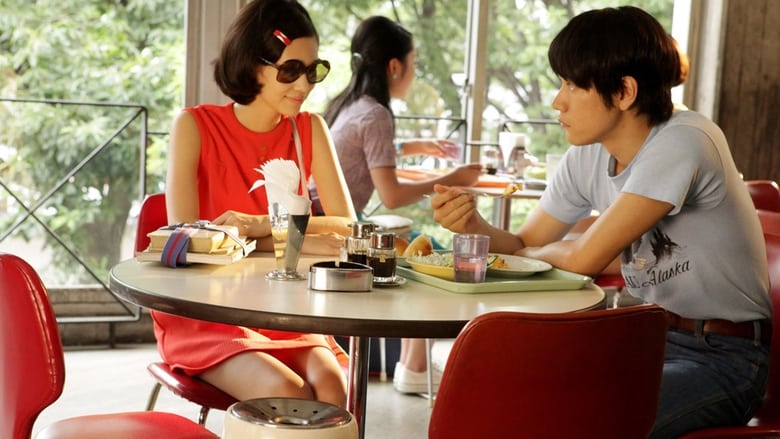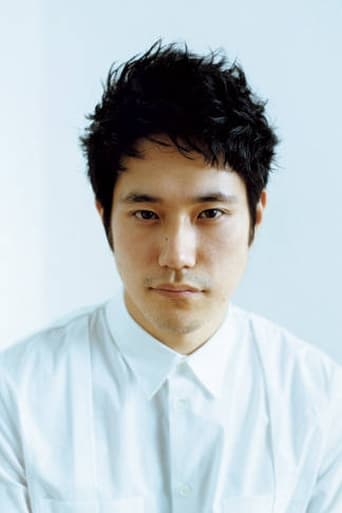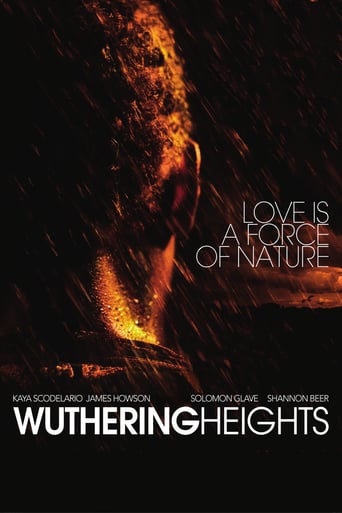

Norwegian Wood (2010)
Toru recalls his life in the 1960s, when his friend Kizuki killed himself and he grew close to Naoko, Kizuki's girlfriend, and another woman, the outgoing, lively Midori.
Watch Trailer
Cast


Similar titles
Reviews
"I guess I've been waiting so long I'm looking for perfection. That makes it tough.""Waiting for perfect love?""No, even I know better than that. I'm looking for selfishness. Perfect selfishness. Like, say I tell you I want to eat strawberry shortcake. And you stop everything you're doing and run out and buy it for me. And you come back out of breath and get down on your knees and hold this strawberry shortcake out to me. And I say I don't want it anymore and throw it out the window. That's what I'm looking for.""I'm not sure that has anything to do with love," I said with some amazement."It does," she said. "You just don't know it. There are times in a girl's life when things like that are incredibly important."=====It's best to see that scene within the correct context. At the beginning of the movie, you have major student protests, confrontations between faculty and students over the relevance of Greek literature to political life--not seeing anything that isn't immediately personally relevant as relevant at all. The book, then, presumably takes place in '68 and I think should be taken as an exploration of that massive event. The political upheaval, the sexual liberation and libertinism, the conflict between traditional and modern values, the sense of alienation, the narcissism of Midori. As you know, second wave feminism was born from the 60s; in one of the early conversations I had with my girlfriend (not yet a girlfriend), I asked her if she knew what feminism is, and she responded, "it says that women should be better than men." I laughed, quite shocked.I think this is the proper context and way to read the scene--1960s narcissism. In this sense, the movie is a very typical, perhaps even ubiquitous, exploration (and critique) in Japanese cinema between tradition and cultural change. You know that the title Norwegian Wood is taken from a 1965 Beatles song.Where Toru's relationship to Naoko seems to represent tradition (by way of his virtuous sense of obligation), Toru's relationship to Midori is much more modern. First, Midori is definitely much more dynamic, aggressive, forward than Naoko: Midori is something of a modern Japanese young woman trying to find her way. And second, and more obviously, the relationship between Toru and Midori comes at the end of a spate of Toru's womanizing. Reinforcing these themes is the subplot between Nagasawa and Hatsumi--Hatsumi ultimately committing suicide because of the infidelity and coldness of Nagasawa, whom she loves. So, on the surface, Naoko represents tradition, which ultimately becomes schizophrenic and commits suicide, and Midori represents the vitality, although uncertain, of the future.But note that Midori redeems herself by waiting for, and ultimately forgiving Toru for rejecting her in favor of his traditionally Japanese obligation toward Naoko; this ushers in a new beginning, on the note of which the film ends. How to account for the capitulation of the narcissistic ethos--in the name of love? Read at a deeper level, Naoko rather than Midori is the true exemplification of uncompromising narcissism.First, note that one of the central plot elements (at least in the film) is that Naoko can't have intercourse because her vagina can't get wet. She never had it with Kizuki, whom she insisted on several occasions to have genuinely loved; she had it only once with Toru. Ultimately, this incapacity for sexual intimacy is a significant contributor to her madness. But, when is the one time when she can get wet, when she has intercourse with Toru? It's prior to her commitment to Toru: it is prior to the commitment to genuine emotional engagement. The only time that she is capable of vaginal wetness is in the fulfillment of bodily pleasure, in the absence of emotional bond to the Other, in a situation where she does not wither in self-consciousness in the gaze of the Other: narcissism sine qua non. Ultimately, her incapacity for physical intimacy is inextricably linked to her madness: her incapacity for physical intimacy mirrors her simultaneous rejection of relationships with others--with her hyperreflexivity, constantly talking about herself, driving herself mad with thoughts about her own self and own feelings, etc.--and ultimate suicide.Here we are starting to see most clearly the focus on the thematic of alienation--of separation of person from person, of personal isolation--that is one of the major subjects of the film, whether through sexuality, through madness, or in extreme conceptions of love. Midori, although appearing to be a real piece of work after her dialogue about love, forgives Toru, so we should be inclined to forgive her. She is a young woman who struggles with contrary conceptions of self, but unlike Naoko, who uncontrollably spirals into herself, escapes into the fantasmal past, and toward suicide, she ultimately compromises with her emotions, and indeed her stated ideal of love--and in a rather conservative conclusion, fulfills the classical motif of the woman faithfully waiting for her man while he is away on a personal journey (seen first in Odysseus and recapitulated throughout the Western literary patriarchy).Does not, then, Midori in fact fulfill a traditional female role, or at least move toward it in a modern way, whereas Naoko is the one who exemplifies inflexibility and the descent into the self and self-destruction? Midori shows herself as a maturing young woman, originally with flawed views and an egregious and possibly insulting stated worldview, but who ultimately compromises her own narcissism for her love of Toru-- even as she claims not to understand Toru's commitment to Naoko. Like in Pulp Fiction, the vision of the film points toward the future rather than the past, but it simultaneously recognizes the logic of the traditional past without inflexibly adhering to it--as when Butch cuts down The Gimp and incapacitates Zed with a samurai sword but rides away on a motorcycle.
Haruki Murukami's novel, 'Norwegian Wood', a tale of a young man painfully out of his emotional depth as remembered from middle age through a faint haze of wistful nostalgia, touches almost everyone who reads it. And Trang Ang Hung 's film is a mostly faithful rendering for the screen, with a delicate touch (although I was expecting the character of Midori to be just a little more wild, and unlike the demure stereotype of a Japanese woman). But for some reason, having previously read (and been duly entranced by) the book, I found the film mostly dull, and I don't think this can be entirely put down to having prior knowledge of the plot. Rather, the book is not just exquisitely sensitive in its writing, but also, surgically precise; and the movie captures only the first half of these qualities. Too often, we see an accurate sample of a relationship that, as described in the original, simply had more complexity than what we get to see in the film. Perhaps also, a film must make corporeal figures who in the book are the ghosts of memory. Read the novel, which is Murukami's best; but I don't think this work adds anything to it.
Well... This is my first review, but I try to keep it short.SPOILER!!This movie is not for everyone, but not because of the sex-scenes, or the suicides. You can not get the whole picture of the story, after seeing it, 'cause there are really big holes in the plot. Holding back information from the viewer is not making it more mysterious, only confusing everything up. The ending of the movie is slightly different from the book. It's a bit more direct, but it's also leaves you to imagine future of the main character.SPOILER OFFDo not watch this film, before reading the original book, from Mr.Murakami Haruki. Trust me, you'll need it, because the cast of the film is not so good, to channel all the emotions of the story.BUT, don not read the book, or watch the film, if you're not into sad, romantic dramas. It's the best, if you're going to watch it with you boy/girlfriend, some hugs at the end should come in handy :)
The poet Rilke said, "There is only one journey. Going inside yourself. Here something blooms; from out of a silent crevice an unknowing weed emerges singing into existence." The unknowing weed takes its time to sing but sing it does in director Tran Anh Hung's film Norwegian Wood, his first since Vertical Ray of the Sun in 2000. Based on the best-selling 1987 novel of Haruki Murikami (which I haven't read), the film reflects the inner journey of 19-year-old Toru Watanabe (Ken'ichi Matsuyama), a journey that embodies the pain of love and loss, the tantalizing embrace of death, the end of dreams, and the beginning of adult responsibility.Scored by Jonny Greenwood with some narration by Watanabe, the film takes place in Tokyo in 1967 in the midst of student protests against the War in Vietnam. Trying to ease the pain of the shattering loss of Kizuki (Kengo Kora), a close friend from high school, Watanabe immerses himself in his studies at school where he is majoring in drama and, with Nagasawa (Tetsuji Tamayama), an older and more experienced friend, is able to release his tension by going to bars and picking up girls for sex. Things change, however, when Kizuki's former girlfriend, the beautiful but emotionally fragile Naoko (Rinko Kikuchi), shows up in Tokyo and reaches out to Watanabe for consolation. Though their language is exceedingly frank and sexually explicit, it is vital to understanding the characters and never used to titillate.Their deepening relationship, however, only brings the feelings of loss closer to the surface and Naoko's ensuing emotional breakdown causes her to leave Tokyo for psychological rehabilitation at a mountain retreat where she is only able to see Watanabe intermittently. Even on occasional meetings, however, they embrace a dark ecstasy that inures them, at least temporarily, from their mutual grief, but when Naoko's roommate, music teacher Reiko (Reika Kirishima), sings the Lennon and McCartney song "Norwegian Wood" at Naoko's 20th birthday party, the line "and when I awoke, I was alone, this bird had flown," evokes tears that flow naturally.Paralyzed by her sadness and feelings of responsibility for Kizuki's death, Naoko sinks deeper into despair and Watanabe's vows of lifelong fidelity are compromised by his attraction to Midori (Kiko Mizuhara), a smart, outgoing student who also has had to overcome a troubled past. Norwegian Wood is not a film about "teenage angst," or any other of the favorite catch phrases that substitute for empathy, but about the essence of life itself and the anguish of having to let go of attachments. More of a tone poem than a free-flowing narrative, the film creates an indelible experience of both exquisite beauty and aching pain, perhaps two sides of the same coin. Like the under-appreciated Tony Takitani, another film based on a story by Murakami, Norwegian Wood unfolds like a dream, evoking a mood of serenity and contemplation.Supported by the stunning cinematography of Ping Bin Lee, much of the film's power takes place in the silences that allow us to simply observe the sublime beauty of the countryside, its forests, waterfalls, and the purity of its winter landscapes. While some may try, the film's emotional roller coaster cannot be filtered out and, in the process of assimilating it, it builds a quiet power that ensnares us and leaves us to explore its meanings long after the final credits. In spite of those who want to attach the label of "boring" to every film that moves slowly and requires concentration, Norwegian Wood will be remembered as one of Hung's best films and a work that brought cinema to a new level of artistic achievement.














